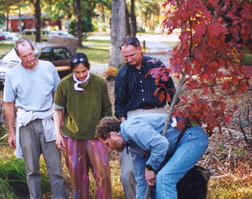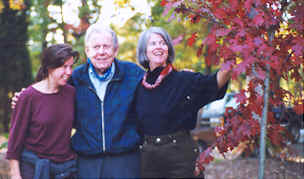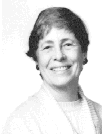
National Water Center, Eureka Springs, Arkansas

National Water Center, Eureka Springs, AR
Updated: April 2014 Contact: Contact: NWC
Contents ©1999-2014 by National Water Center. All rights reserved worldwide.
WaterWorks Journal volume 5, MM
(press here to return to full Table of Contents)
the last drop
Finish Jim's Work
Herman Greene
Memorial Tree Planting Honors
Jim Berry
Naming Our Home
Eleanor Rae
Inside Back Cover
Pages 48 & 49
Finish Jim's Work
by Herman F. Greene
For Panel on Jim Berry's Life and Work, Camp New Hope, North Carolina,
October 24, 1998, Revised for publication, March 2000.
What must we be about, in order to be about finishing the work of James Fant Berry?
When Moses led the Hebrew people out of Egypt and eventually into the promised land of Israel, before the people entered the promised land they wandered around for forty years. Moses, himself, never entered the promised land. He went up on a mountain and saw it, but he never entered the promised land.
So James Fant Berry never entered the promised land of the Ecozoic Era. He went up on a mountain and saw it. He taught us about it. He gave guidelines and principles and visions to realize it. But his time was up before he himself could enter this land.
He left us, and one day his brother Thomas Berry will leave us, realizing that bringing about the Ecozoic Era is up to those who would live after him, in other words us. And if we are to finish his work we must be about fulfilling his grand vision--"Our hope lies in the prospect that we will find our way into the Ecozoic Era quickly."
If this task is ours, then what are we, guided by Jim, to do as our part in bringing into being this Ecozoic Era? Here are some things that have occurred to me as I re-read Jim's work.
1. Keep Alive the Legacy of Jim Berry - First, let's keep alive the legacy of Jim Berry. This struggle to bring into being the Ecozoic Era will be hard. We need heroes to guide us, and here is one giant of a man to keep us and strengthen us on the way. We need to keep the Center for Reflection on the Second Law going under the guidance of his grand daughter, Acasia Berry. We need to see that, through this Center, his circulars are published as a book, and give it wide distribution. After reading through the circulars, I feel they need to be edited very little and all, or almost all of them need to be published. Even the announcements at the end of the circulars stating who he was meeting with from time to time have meaning.
2. Wake Up! Speak for the Earth. Can we be autistic anymore, if we have been touched by this wonderful man. Can we anymore caught in withdrawal fantasies and illusion, unable to perceive our environment realistically? Will we continue to have extreme resistance to change of any kind as it affects our basic patterns of life? This is a man, Jim Berry, who appeared before meetings of governmental and civic bodies in the Raleigh-Durham area of North Carolina, and when recognized to speak he would say, "I am Jim Berry, and I speak for the Earth." If we are to finish Jim's work, we must also speak for the Earth.
3. Find Meaningful Work - Also, if we are to finish Jim's work, we must find in our lives meaningful work. This is something will find very challenging because we are all sustained in being by the very system that is, in Jim's words, "violating the integrity of creation." Yet, nothing I can imagine would please Jim more than that we could one day report to him, in our meditative counsel with him, that we have found and are about meaningful work that involves us in a meaningful and coherent manner with in the functioning of the Earth.
4. Live Fully, Listen, See, Touch, Feel, Smell and Taste the Earth. Jim has invited us to a feast of being, one where we are fully in touch with our authentic selves:
The human psyche demands beauty and grace, demands complexity, demands daring, demands narrow balances and margins, demands austerity, esteems frugality and sacrifice, demands leanness, demands virtue, demands fun and laughter, understands sorrow, abhors violence, shuns meanness; requires love in huge amounts, needs generosity.
Will we open ourselves to such a feast of life?
5. Live the New Paradigm, Be the Ecozoic Era. Jim has spoken to us of a new paradigm:
The new paradigm sees Earth as sacred being, the maternal principle, alive with a spirit of its own out of which we are born and whence we derive all that we are and all that we have; recognizes that we are Earthlings, that Earth is our origin, our support, our nourishment, our guide, our spirituality itself; says that if there is no spirituality in the Earth there is no spirituality in us; that we are a dimension of the Earth The new paradigm is a lot more than this, but underneath, it is the new consciousness of self and unity with the whole, of integration along with differentiation, of belonging, of being "imbedded in nature."
Can this be our paradigm? Can we live now as harbingers of the Ecozoic Era, of a vision of the future the promise of which yet to be, but now may be realized, a little bit, in us?
We must do so, if we are to finish Jim's work.
Jim's Call to Us
We have had a giant walk among us, my friends. Let us never forget this great and gentle man.
Jim calls out to us, "FINISH MY WORK!" "FINISH MY WORK!"
© Herman F. Greene Daniels & Daniels, P.A. PO Drawer 12218 Research Triangle, Park, NC 27709-2218,
Telephone 919-544-5444 Facsimile 919-544-5920 Visit us at www.daniels.com
Memorial Tree Planting Honors Jim Berry
Among the many “jobs” for the Earth that Jim Berry did, one was serving as a member of the Board of Directors for the North American Coalition on Christianity and Ecology (NACCE).
To honor the memory of Jim, the Board of Directors for NACCE arranged to have a tree planted at Camp Good Hope as a tribute to a friend, colleague and inspiration.

Dennis Testerman, NACCE Board Member plants
the tree as,Dave Cook, Ruth Rosenhek and
Herman Greene look on.

Acasia, Thomas and Ann admire this living tribute to Jim.
Page 50
Naming Our Home
by Eleanor Rae
 My involvement with the bioregional movement has only been sporadic but it has been very meaningful. I first heard about bioregionalism from one of its founders, David Haenke, with whom I served on the board of the North American Conference on Christianity and Ecology (NACCE). It struck me that here was a movement that offered a vision of a viable future. So, when the North American Bioregional Congress lV met in the Gulf of Maine in 1990, I decided to attend. Writing about the Congress years later for my book Women, the Earth, the Divine, I noted the following: “...several strong impressions remain with me. These include a model where play was truly as important as work; the presence of those who spoke for other life forms such as spiders; the conviction that by utilizing the facilitation skills of someone like a Carolyn Estes, a large diverse group could effectively make decision by consensus; the change of name from North American Bioregional Congress to Turtle Island Bioregional Congress to better reflect our native roots; the certainty that this was a movement begun and led by the Spirit”. (p. 55). These are issues that I would held to still to critical if the Earth is to be restored to its former beauty.
My involvement with the bioregional movement has only been sporadic but it has been very meaningful. I first heard about bioregionalism from one of its founders, David Haenke, with whom I served on the board of the North American Conference on Christianity and Ecology (NACCE). It struck me that here was a movement that offered a vision of a viable future. So, when the North American Bioregional Congress lV met in the Gulf of Maine in 1990, I decided to attend. Writing about the Congress years later for my book Women, the Earth, the Divine, I noted the following: “...several strong impressions remain with me. These include a model where play was truly as important as work; the presence of those who spoke for other life forms such as spiders; the conviction that by utilizing the facilitation skills of someone like a Carolyn Estes, a large diverse group could effectively make decision by consensus; the change of name from North American Bioregional Congress to Turtle Island Bioregional Congress to better reflect our native roots; the certainty that this was a movement begun and led by the Spirit”. (p. 55). These are issues that I would held to still to critical if the Earth is to be restored to its former beauty.
Another key element of the bioregional movement that speaks to me with ever greater clarity is the centrality of water to its members. Thus, at the Gulf of Maine gathering, people spoke not of being from Ohio, but from the Ohio River Valley Watershed; not of being from San Francisco, but from the San Francisco Bay Bioregion; not of being from Connecticut, but from the Long Island Sound Watershed. Using one’s watershed as a critical component in identifying one’s home was something new for me. And over the years it has taken on added significance: both as I travel to other bioregions and in regard to Ridgefield, CT, the place where I have now lived for over thirty years. I have learned that defining one’s watershed is not always an easy matter but that one can learn much in the process. Only recently have I learned that eight rivers originate in our small town. And that they flow in three different directions: to the west and the Hudson River Valley, to the south into Long Island Sound, and to the east and the Housatonic River Valley. Where we actually live, the waters resulting from heavy rain and snow run-offs seemed to be journeying south. I recently tried to follow these waters but was forced to turn back because of the thickness of the undergrowth of the mountain laurel and a bite given me by a Bernese Mountain dog. I will try again another day but right now I am just enjoying in my mind’s eye the journey of the waters as they leave our yard and make their way eventually to Long Island Sound. Here they will mix with the waters coming from the Atlantic Ocean and become part of the great hydrological cycle of our Earth.
What is the name of the bioregion that you call home?
Eleanor Rae, Ph. D., is a theologian by profession and a lover of the Earth by passion. She is past president of the North American Coalition on Christianity and Ecology (NACCE) and founder / president of the Center for Women, the Earth, the Divine (C:WED). She is currently working on a book on women, the Earth, and the world’s religions. Recently C:WED has been officially recognized by the UN as an NGO.
Inside Back Cover
Robert McAfee, Michael Flitter,
Publishers
Barbara Harmony, Robert McAfee,
Editors
John D. Hunt, Environmental
Education Liaison
Aleasha Dees,
Educational Projects & Training
Sorrayut Ratanapojnard,
International Affairs
William Dees,
Web Master & Information Systems
Tim Overdier,
Physical Science
Mark Ellis,
Public Policy & Technology
Patrick Evans,
Photography Editor
Renee Stormes,
Marketing
Betty McAfee, Sharon Brewster,
Advertising
Brenda McBride,
Copy Editor
Shelley Hunter,
Archivist
Waterworks (ISSN: 1073-0230) is dedicated to the publication of information on the provision and equitable allocation of SAFE WATER; the conservation, protection and sustainable management of the FRESHWATER ECOSYSTEM; and, a better appreciation and understanding of the WATER ENVIRONMENT. Waterworks is by PKI EcoPublishing, Hackett, Arkansas and is printed by AIphaGraphics, Fort Smith, Arkansas.
© Copyright 2000 the Peaceable Kingdom, Inc., International
Thinking Like A Mountain Institute and PKI EcoPublishing, Hackett, Arkansas.
Permission to Reprint There is no charge for reprinting material, however permission in writing must be obtained from the Publisher.
Member:
Arkansas Environmental Educational Association
North American Association for Environmental Education
North American Coalition on Christianity and Ecology
The MISSION of the Peaceable Kingdom, Inc., PKI, is to promote safe water for you and the world. In order to fulfill this mission PKI has developed a number of strategies to: assist local communities to provide safe water; implement educational programs to increase awareness and understanding of the water environment, through its Thinking Like A Mountain Institute; advocate conservation and protection of the freshwater ecosystem; and publicize all aspects of these through various publications and informational outlets.
About our names . . .
The Peaceable Kingdom was chosen to emphasize the need for humankind to make peace with the Earth. We must learn to coexist with all forms of life and to preserve our natural ecosystems and the splendid diversity of our water planet. Our mission: To provide the world with clean / safe water, ensuring a healthy and equitably available water environment for all - water for people, water for life.
Thinking Like A Mountain Institute (TLAMI) is taken from the classic essay by Aldo Leopold in his "A Sand County Almanac". Building on the philosophy put forth in this essay; TLAMI promotes the development of holistic educational methods to examine complex environmental issues. The basic premise is to "look at the big picture" and demonstrate the inner-connectedness of everything. TLAMI encourages creativity and "thinking outside the box." TLAMI produces curriculums and provides facilitation services. Commencing in 2000 a series of workshops will be offered. These will include Adult EE - Lifelong Learning, Civics for the Environment and others.
PKI is a nonprofit corporation registered in the state of Arkansas and recognized by the IRS as a 501 (c) 3 tax-exempt, charitable not-for-profit organization. PKI is an equal opportunity employer and provider of environmental and educational services and does not discriminate as to age, race, creed, sex, sexual orientation, economic or social status, political or religious affiliation, physical or mental disability. PKI is not affiliated with any political or religious organization. The registered corporate office, PKI International, is located at 2610 West Hackett Road, Hackett, Arkansas 72937. All correspondences should be addressed to PKI, Post Office Box 210, Hackett, AR 72937-0210; email pkitlami@aol.com

Scroll down to see individual titles in this section.